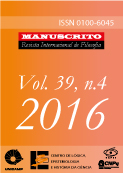Resumo
Temporal dynamists argue that we should believe that there exists temporal passage because there being passage is the best explanation for the presence of our temporal phenomenology. Presentists argue that presentism is the best (and perhaps only coherent) version of temporal dynamism. Therefore, conditional on us accepting temporal dynamism, we should accept presentism. In this paper it is argued that if we understand temporal passage as the presentist does, such an argument can succeed only if dualism is true. Thus, we conclude, either presentists should embrace dualism, or they should reject any argument for presentism that proceeds via any such argument for temporal passage that proceeds via considerations of what best explains our temporal phenomenologyReferências
BARON, S. (forthcoming). “Feel the Flow” Synthese.
BIGELOW, J. “Presentism and properties”. Philosophical Perspectives 10 (Metaphysics):35-52, 1996.
BOURNE, C. A Future for Presentism. Oxford, Oxford, 2006.
BROAD, C. D. Scientific Thought. Routledge and Kegan Paul, 1923.
BUTTERFIELD, J. The Arguments of Time. OUP, 2006.
CALLENDER, C. “Time’s ontic voltage.” In The Future of the Philosophy of Time (A. Bardon, ed.), 73–98, Routledge, London, 2011.
CAMERON, R. The Moving Spotlight: an essay on time and ontology. OUP, 2015.
CHALMERS, D. The Conscious Mind. OUP, 1996.
CRAIG, W. L. The Tensed Theory of Time: A Critical Examination. Kluwer Academic Publishers, Dordrecht, 2000.
CRISP, T. M. “Presentism and the grounding objection.” Noûs (41): 90–109, 2007.
DAINTON, B. “Time, passage, and immediate experience.” In The Oxford Handbook of Philosophy of Time (A. Bardon, ed.), 381–418, Oxford University Press, Oxford, 2011.
FORREST, P. “The read but deal past: A reply to Braddon-Mitchell” Analysis 65 (4): 358-362, 2004.
FORREST, P. “Uniform Grounding of Truth and the Growing Block Theory: A Reply to Heathwood.” Analysis 66 (290): 161-162, 2006.
HOERL, C. “Do we (seem to) perceive passage?” Philosophical Explorations, 17, 188–202, 2014.
HORGAN, T. and TIENSON, J. “The Intentionality of Phenomenology and the Phenomenology of Intentionality,” in D. Chalmers, Philosophy of Mind: Classical and Contemporary Readings, Oxford: Oxford University Press, 520–933, 2002.
KRIEGEL, U. “Real Narrow Content,” Mind and Language, (23): 305–328, 2008.
KRIEGEL, U. and Horgan T. forthcoming, “The Phenomenal Intentionality Research Program,” in Terry Horgan and Uriah Kriegel (eds.), Phenomenal Intentionality: New Essays, Oxford: Oxford University Press.
LEININGER, L. “Presentism and the Myth of Passage”. Australasian Journal of Philosophy 93 (4):724-739, 2015.
MCTAGGART, J. E. “The unreality of time”. Mind 17 (68):457–474, 1908.
MAUDLIN, T. “Remarks on the passing of time.” Proceedings of the Aristotelian Society (102): 237–252, 2002.
MAUDLIN, T. The Metaphysics Within Physics. Oxford University, Oxford, 2007.
MARKOSIAN, N. “A Defence of Presentism”. Oxford Studies in Metaphysics 1 (3):47-82, 2004.
MCCALL, S. A Model of the Universe. Clarendon Press, 1994.
PAUL, L. A. “Temporal experience.” Journal of Philosophy (107): 333–359, 2010.
POIDEVIN, R. The Images of Time. Oxford University Press, Oxford, 2007.
PRICE, H. Time’s Arrow and Archimedes’ Point: New Directions for the Physics of Time. Oxford University Press, New York, 1996.
PRICE, H. “The flow of time.” In The Oxford Handbook of Time (Craig Callender, ed.), 276–311, Oxford University Press, Oxford, 2011.
PROSSER, S. “A new problem for the A-theory of time.” Philosophical Quarterly (50): 494–498, 2000.
PROSSER, S. “Could we experience the passage of time?” Ratio (20): 75–90, 2007.
PROSSER, S. “Why does time seem to pass?” Philosophy and Phenomenological Research (85): 92–116, 2012.
PROSSER, S. “Passage and perception.” Noûs (47): 69–84, 2013.
SKOW, B. “Experience and the passage of time.” Philosophical Perspectives (25): 359–387, 2011.
TALLANT, J. “Ontological cheats might just prosper”. Analysis 69 (3):422-430, 2009.
TALLANT, J. “Still cheating, still prospering”. Analysis 70 (3):502-506, 2010a.
TALLANT, J. A Sketch of a Presentist Theory of Passage. Erkenntnis 73 (1):133-140, 2010b.
TALLANT, J.“(Existence) Presentism and the A-theory.” Analysis 72 (4): 673-
, 2012.
TOOLEY, M. Time, Tense, and Causation. Clarendon Press, 1997.
ZIMMERMAN, D. Presentism and the space-time manifold. In Craig Callender (ed.), The Oxford Handbook of Philosophy of Time. Oxford University Press 163—246, 2011.

